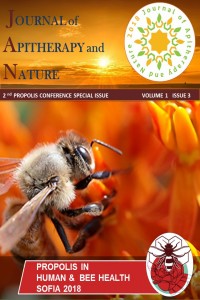Emerging Impact of Bee Propolis for Gut Health: Evidence and Mechanisms
Abstract
Bee propolis is an important hive product and considered beneficial to
health. However, evidence of its potential for improving gut health is still
lacking. We hereby investigated the effects of dietary supplementation with
propolis against dextran sulfate sodium (DSS)-induced acute colitis model in
rats. Moreover, effects of propolis extracts on intestinal barrier function
were explored in human intestinal epithelial cells. Rats were fed with control
diet or supplemented with different amounts of Chinese propolis (0.1%, 0.2%,
and 0.3%) to examine effects on acute colitis induced by 3% DSS in drinking
water. Propolis at 0.3%, but not lower levels, significantly improved colitis
symptoms compared with the control group, with a less pronounced disease
activity index (DAI), a significant increase in colon length/weight ratio and
an improved distal colon tissue structure as assessed by histology. Although
short chain fatty acid levels in digesta were not altered by propolis
supplementation, 16S rRNA phylogenetic sequencing revealed a significant
increase in gut microbial diversity after 21 days of 0.3% propolis
supplementation compared with controls including a significant increase in
bacteria belonging to the Proteobacteria and Acidobacteria phyla.
In human intestinal epithelial cells, propolis increased transepithelial
electrical resistance with organized expressions in proteins related to TJ
assembly, i.e., occludin and ZO-1, by activating AMPK and ERK signaling.
Overall, these data provide new insights into understanding the beneficial
effects of propolis on gut health and have important implications for human IBD
prevention/treatment.
Keywords
References
- .
Abstract
References
- .
Details
| Primary Language | English |
|---|---|
| Journal Section | 2nd Propolis Conference Special Issue |
| Authors | |
| Publication Date | December 8, 2018 |
| Published in Issue | Year 2018 Volume: 1 Issue: 3 - 2nd Propolis Conference Special Issue |
Cite
- Google Akademik (Google Scholar)
- idealonline
- Directory of Research Journal Indexing (DRJI)
- Asos İndeks

